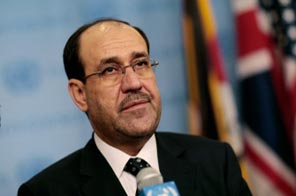PM Maliki emerges as front-runner after Iraq vote
BAGHDAD: Prime Minister Nuri al-Maliki, the Shiite who helped ease Iraq's sectarian strife, emerged Monday as a front-runner in a parliamentary election but could yet face a tough battle to cling to power.
Maliki polled well according to early forecasts from Iraq's second election since the 2003 ouster of Saddam Hussein, which saw millions shake off the fear of bomb, mortar and rocket attacks that killed 38 people to cast ballots.
President Barack Obama, who has promised to withdraw all US troops from Iraq by the end of next year, paid tribute to "the courage and resilience of the Iraqi people who once again defied threats to advance their democracy."
The key estimates from the Baghdad region, which could swing the result of the vote, were not yet available Monday but local officials said Maliki's political bloc was so far leading the count in nine of Iraq's 18 provinces.
Maliki's State of Law Alliance was ahead in Shiite regions, while Iyad Allawi, a former premier who heads the Iraqiya list, was leading in Sunni areas, said estimates AFP obtained from officials across the country.
Official final results are not due until the end of March and it is then likely to take months of horsetrading before a new government is formed.
But early indications were positive for Maliki. A source close to the prime minister said it now looked like his list was going to get 100 seats in the 325-seat parliament.
Maliki was appointed prime minister in 2005 as a compromise candidate and his administration, with considerable help from the US military, sharply reduced the Sunni-Shiite sectarian strife that killed tens of thousands in the wake of the 2003 US-led invasion that ousted Saddam.
He played down his party's Shiite religious roots in his campaign for this election and sought to portray himself as the leader who restored security to Iraq, a claim dented by a series of recent bombings.
One analyst, however, said even if Maliki's list was triumphant, his unpopularity among Iraq's many political parties could prevent him from remaining prime minister.
"His relations with the Kurds, who play a key role in parliament, are not good," said Hamid Fadel, a political scientist at Baghdad university.
"The Iraq National Alliance accuses him of concentrating power in his own office and the Sunnis accuse him of launching a 'de-Baathification' process aimed at them," he told AFP.
Maliki's main challenger, according to the initial estimates, is Allawi, whose Iraqiya is a mostly Shiite slate that has campaigned on a nationalist and non-sectarian ticket.
The other leading list is the Iraq National Alliance, dominated by two Shiite religious parties -- the Supreme Iraqi Islamic Council and the movement of radical leader Moqtada al-Sadr, who led two uprisings against US troops.
Whoever forms the new government, they will be tasked with tackling still high levels of violence, an economy in tatters and a culture of endemic corruption.
Seven years after the invasion, much of Baghdad remains bomb-damaged, most homes receive only a few hours of mains electricity a day and lack clean drinking water, and a quarter of the Iraqi population is illiterate.
Sunday's vote saw Sunni Arabs return to the ballot box in large numbers, in stark contrast to their 2005 boycott in protest at the rise to power of the long-oppressed Shiite majority.
Turnout across the country was about 60 percent, an election official said, which showed most Iraqis were undeterred by an Al-Qaeda threat to kill people who dared to vote.
As Iraq counted the votes, Britain's Foreign Secretary David Miliband said his country's decision to back the US-led invasion had earned it respect in the Middle East.
Giving evidence to a public inquiry in London into Britain's role in the conflict, Miliband insisted that despite all the violence, Iraq now had the potential to be a beacon of democracy and human rights in the region.
The ferocious insurgency that followed the 2003 invasion was the subject of a film that on Sunday triumphed at the Oscar awards in Hollywood.
"The Hurt Locker," about a US Army bomb disposal squad in Iraq, scooped best director award for its director Kathryn Bigelow as well as the best film and best screenplay prizes.






